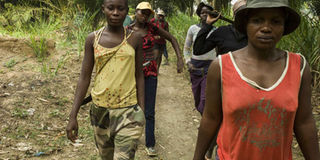C.Africa peacekeepers declare war on 'anti-balaka' vigilantes

Women, presenting themselves as anti-balaka and "Amazons" protecting their island from the members of the ex-Seleka, walk on the Mbongo Soa island, in Bangui, on February 21, 2014. The Central African Republic has been torn by bloody sectarian clashes since Muslim rebels ousted president Francois Bozize in March 2013 and replaced him with their leader Michel Djotodia, who was himself forced out last month. But violence has continued unabated since then between Christian vigilantes and minority Muslims who have fled the capital in their thousands in search of safety. AFP PHOTO / FRED DUFOUR
What you need to know:
- Around 20 people have died in clashes involving armed groups and foreign peacekeepers in Bangui since Saturday.
- The UN's expert on the CAR warned Wednesday that serious rights abuses were going unpunished.
- Underscoring global concern about the situation, the head of the International Committee of the Red Cross, Peter Maurer, arrived in Bangui on Wednesday for a three-day visit.
Peacekeepers in the Central African Republic declared war on the majority-Christian vigilante known as "anti-balaka" on Wednesday as the UN warned the militia had crossed a red line by attacking international troops.
The head of the MISCA African force blamed the groups for a series of attacks on peacekeepers in the former French colony, and said they would be treated as "enemies".
"From now on, we consider the anti-balaka as enemies of MISCA," Congolese General Jean-Marie Michel Mokoko said in remarks carried by a private radio station. "And we will treat them as such."
"They even fire on people who are here to try to end this crisis on behalf of the Central African people to which they belong," the general said. "We hold them responsible for attacks that have targeted our troops in recent days."
Around 20 people have died in clashes involving armed groups and foreign peacekeepers in Bangui since Saturday.
The top United Nations envoy to the country, Babacar Gaye, said the clashes were a "very serious" matter.
"Soldiers from the international forces MISCA and Sangaris — whose actions I salute — have been attacked by armed groups. Which is something very serious involving soldiers acting with a mandate from the United Nations Security Council," he told a press conference in Bangui.
Some 8,000 foreign troops are working to disarm Central African rebel groups after a year of inter-religious violence.
Security is tight ahead of this week's first anniversary of the toppling of Francois Bozize by majority-Muslim Seleka rebels, which sparked the current unrest.
The country's interim president Catherine Samba Panza also denounced the attacks on national radio.
"It is not acceptable that these forces have become targets of certain armed groups who do not want peace," she said, while promising that the peacekeeping forces would carry on their work.
"From Bangui to the rest of the country, they will carry on disarming these groups wherever they are. Believe me, we will not have a lawless zone."
The so-called "anti-balaka" militias were formed in response to killing and pillaging by Seleka rebels who went rogue after last year's coup.
Anti-balaka means "anti-machete" in the local Sango language and refers to the weapon of choice wielded by the Seleka — but also taken up by the vigilantes.
Thousands have been killed and around a quarter of the country's 4.6 million people displaced.
Muslim residents of Bangui have been besieged for weeks by the anti-balaka as well as by looters in the PK-5 commercial district of the city.
Both French and African troops opened fire during the recent fighting, according to military officials. Local residents said they shot dead eight members of the anti-balaka, including a militia leader.
ABUSES GOING UNPUNISHED
The UN's expert on the CAR warned Wednesday that serious rights abuses were going unpunished.
"The human rights situation has continued to deteriorate since the crisis began, despite all the efforts deployed by the new authorities and the international community," said Marie-Therese Keita Bocoum in a report.
"Violations and the most appalling kinds of abuses are taking place without any form of justice," said Bocoum, who visited the country this month after the UN Human Rights Council appointed her to assess the situation.
Bocoum named the anti-balaka, but also said the Lord's Resistance Army — which originated in Uganda — was partly responsible for a spike in attacks on Muslims.
Underscoring global concern about the situation, the head of the International Committee of the Red Cross, Peter Maurer, arrived in Bangui on Wednesday for a three-day visit.
"Months of unprecedented armed conflict and inter-religious violence have caused a catastrophic humanitarian situation," said the ICRC, which has 400 workers in the impoverished country.
Almost 2,000 French troops have been sent to the landlocked nation to support the 6,000 MISCA soldiers in their bid to restore a modicum of security.
The international forces initially focused on disarming the Seleka fighters in Bangui, but in recent weeks both foreign peacekeepers and the Central African authorities have warned of the need to address abuses by the anti-balaka.
Responding to the general's allegations, Emotion Brice Namsio, who describes himself as an anti-balaka coordinator, denied that the vigilantes had fired on peacekeepers.
MISCA troops "began firing on peaceful civilians and everyone always wants to pin the blame on the anti-balaka. No, it's too much," he told reporters.
"The anti-balaka... are not enemies of the peace, rather, it is MISCA that is an enemy of the central African people."




